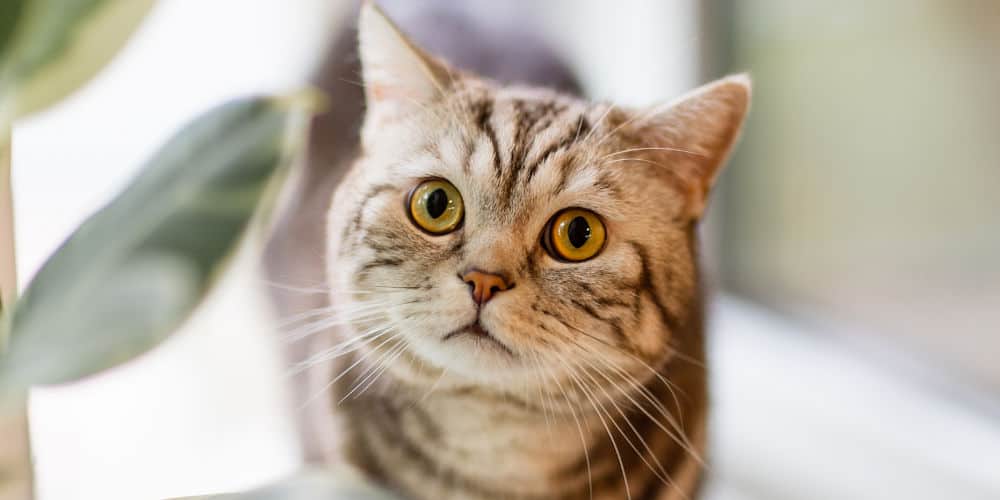Why Do Cats Ears Get Hot?

Cats can be great life companions. They are quite temperamental, but they will, on occasion, let your pet and scratch their ears. When touching their ears, you may wonder why they feel hot. There are a few different causes for warm cat ears, and to keep your cat healthy, they are essential to know about.
On average, cat’s ears are naturally hot because of their warmer internal body temperature than humans. A cat’s ear is used as a temperature-regulating mechanism. Depending on the cat’s environment, the ears can help keep the cat cool or warm. However, cat ears may be hot because of other illness-related issues that may need medical attention.
Once you know the causes of your cat’s ears being hot, you can make sure you are giving them proper care. Read on to find out what all the reasons are for hot cat ears.
Cat Attitudes is reader-supported. When you buy through links on our site, we may earn an affiliate commission.
Why Do Cat’s Ears Get Hot?
There are a couple of different reasons why a cat’s ears get hot. Most of the time, it is harmless, but there are some other things you can look out for to make sure your cat is healthy. These are the common reasons why a cat’s ears get hot.
Their Natural Internal Temperature
As humans, we naturally compare our body temperature to the things around us. If we are in a cold environment, we are going to think every animal is cold too. But that is not the case. Cats, like other animals, can have different reactions to temperature and may not be reacting the same way as humans.
In the case of cats, their internal body temperature is higher than humans. The average temperature is around 103 degrees compared to a human’s 98-99 degree temperature. This means a cat’s ears may feel hot because of their natural temperature.
Temperature Regulating Processes Involve the Ears
A cat will utilize its ears to keep them at a comfortable temperature in its environment. Their ears will be used as a place where heat can be expelled and keep them a bit cooler if their environment is warm. The blood flow will increase to the ear, making the ear hot and helping the cats cool down.
A warm ear is a sign that your cat is friendly and is trying to cool off. If there are no other hot spots on your cat, it signifies temperature regulation and should not be a cause for alarm.
A Fever
Cat ears can be warm because of an illness, but that is rare. A fever in a cat is a temperature above 102.5 degrees. If you notice your cat’s ears are hot and your cat may be seeking cold environments, there is a possibility that they have a fever. Hot ears are not the only sign, though; there are other symptoms to look for that will make it clear your cat has a fever.
Fevers are caused in cats due to an infection or illness. Usually, fevers in cats go away pretty quickly and will last only a short time. If you notice a fever lasting more than 1-2 days, it is worth bringing your cat to the doctor to get proper treatment.
Signs of Fevers in Cats
There are a couple of different signs there are fevers in cats. One of them can include hot ears, but that is not the most reliable sign.
- Isolating themselves
- Lethargic behavior/any behavior out of the ordinary
- Loss of appetite
- Constipation
- Diarrhea
- Rapid breathing/heart rate
- Seeking cold environments
- Arching the back
- Stretching often
- Hot all over the body
These symptoms are better signs of a fever in cats because they are not part of other temperature-regulating processes. If you notice your cat has hot ears, it is worth checking out to see if they have other symptoms before deciding they have a fever.
Ear Infections
Finally, a cat’s ears can get warm due to ear infections. Cats’ can have a buildup of wax in their ears which can cause moisture and debris to become stuck in the ear canal. The skin of a cat’s ear is so close to the elements that water can collect in the ear and cause infections. This can cause an infection in the ear and cause blood to rush to the ear to heal the infection.
If your cat has brown discharge from their ears, the ears smell musty, or you notice them itching their ears a lot, there is a good chance they have an ear infection. The natural reaction is for the ears to get hot. See the vet to help your cat feel better and heal the infection.
Should Cat’s Ears Be Warm or Cold?
A Cat’s ears are temperature regulating, meaning they can be warm or cold. This means that the environment they live in can affect their body temperature. A cat’s ears will be used as a cooling or heating system for the cat, depending on the environment’s temperature.
The amount of blood flow released to the ears depends on the temperature. More blood is pushed through when it is warm to bring down the temperature. This will lead to a warm ear. If it is cold, blood is restricted to keep all the warmth trapped inside the cat, leaving them with cold ears.
Both of these situations are normal for cats. There is no cause for alarm and will keep the cat healthy and comfortable in their environment.
Other Causes Of Ear Problems in Cats
There are some other reasons why your cat may have some ear problems. The heat you feel in their ears can be expected, but if you notice any of these other signs or symptoms, take your cat to the vet!
- Ear Mites: If you notice that your cat has signs of ear infection, it could be caused by ear mites. The best sign your cat has ear mites is constant scratching of the ears, which may cause them to become warm.
- Polyps: Your cat may have growths in their ear canals called polyps. This can cause your cat to have symptoms of fever and shake its head, causing warm ears.
- Mange: Mange is a severe illness that is caused by mites. There may be some red, crusty sores around the ear and can cause your cat to constantly itch, causing heat to rush to the outer ear.
- Foreign Objects: If your cat goes outside, you may notice foreign objects can get stuck in their ears. This can cause redness and constant scratching of the ear to get the item out.
- Bites and Scratches: A cat can get bites and scratches around the ears, especially if it is in an environment with other cats. These can cause infections and a hot ear.
- Allergies: Cats can have allergies to foods and environmental triggers. This can cause itchy ears and cause your cat to itch and have hot ears.
These ear problems can be fixed with proper treatment and can help eliminate the hot ear situation if it is caused by one of these other problems.
Final Thoughts
Don’t worry! If you notice your cat has hot ears, it should not be a cause for alarm. Ensure they do not have symptoms of fevers or other ear problems, but don’t worry if none of those signs are there. Your cat’s ears are part of their normal body processes and can help your cat!
Sources:
